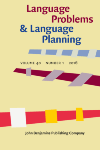
Language Problems & Language Planning
Scope & Guideline
Bridging Theory and Practice in Language Studies
Introduction
Aims and Scopes
- Language Policy and Planning:
The journal emphasizes the development, implementation, and evaluation of language policies across different regions and contexts, examining how these policies affect language use and rights. - Linguistic Justice:
A core area of focus is the concept of linguistic justice, which explores the equity and rights associated with language use, particularly in relation to minority languages and marginalized communities. - Language and Identity:
The journal investigates the role of language in shaping identities, including national, ethnic, and cultural identities, and how language practices reflect and influence these identities. - Revitalization of Endangered Languages:
An important aspect of the journal's scope is the revitalization of endangered languages, discussing strategies, policies, and community efforts aimed at preserving linguistic diversity. - Language and Conflict:
The intersection of language and conflict is another significant theme, exploring how language policies can serve as tools for conflict prevention and resolution. - Multilingualism and Globalization:
The journal addresses the challenges and dynamics of multilingualism in the context of globalization, including the effects of language dominance and the rise of global languages.
Trending and Emerging
- Linguistic Rights and Legislation:
There is a growing focus on the legal frameworks surrounding language rights, particularly in the context of European institutions and international law, reflecting an increasing awareness of the importance of legal protections for linguistic diversity. - Language and Social Justice:
Emerging discussions around social justice and equity in language use have gained prominence, emphasizing the role of language in addressing social inequalities and advocating for marginalized communities. - Impact of Globalization on Language Use:
Research is increasingly addressing the complexities of language use in a globalized world, including the effects of migration, technology, and cultural exchange on language practices and policies. - Indigenous Language Revitalization:
There is a notable increase in studies focused on the revitalization of indigenous languages, highlighting the importance of preserving linguistic heritage and cultural identity in various regions. - Digital Language Management:
The impact of digital technologies on language planning and policy is becoming a significant theme, exploring how digital platforms influence language use, accessibility, and policy implementation.
Declining or Waning
- Language and Gender Studies:
Research focused specifically on language and gender dynamics has decreased, suggesting a potential shift toward more intersectional approaches that incorporate gender within broader discussions of language and identity. - Standardization of Languages:
The emphasis on language standardization processes has waned, perhaps reflecting a growing recognition of the value of linguistic diversity and the need for more flexible language practices. - Translation Studies:
Although translation remains relevant, its specific exploration in terms of policy and practice appears less frequent, indicating that discussions may be integrating translation into broader themes of language management and policy. - Language Economics:
Research examining the economic aspects of language use and policy, including the economic impact of language planning, has not been as prominent, suggesting a potential decline in focus on this intersection. - Historical Perspectives on Language Planning:
The exploration of historical contexts and their influence on contemporary language planning efforts appears to be less emphasized, indicating a possible shift toward more current and practical applications of language policy.
Similar Journals
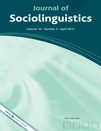
JOURNAL OF SOCIOLINGUISTICS
Fostering Critical Dialogue in Language StudiesThe Journal of Sociolinguistics, published by Wiley in the United Kingdom, is a leading interdisciplinary journal that explores the intricate relationships between language and society. With an impressive impact factor reflecting its Q1 quartile ranking in Histories and Philosophy of Science, Linguistics, Philosophy, and Sociology, this journal is recognized for its scholarly contributions, making it a vital resource for academics and practitioners in these dynamic fields. Covering a wide scope of topics from language variation and change to sociocultural dynamics, the journal has converged from 2004 to 2024, ensuring a comprehensive understanding of contemporary sociolinguistic issues. Although operating under a traditional access model, the Journal of Sociolinguistics remains pivotal for advancing critical dialogue and research for professionals, researchers, and students invested in linguistic and sociological studies.
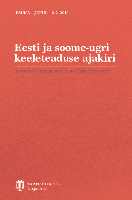
Eesti ja Soome-Ugri Keeleteaduse Ajakiri-Journal of Estonian and Finno-Ugric Linguistics
Championing Open Access to Linguistic DiscoveriesEesti ja Soome-Ugri Keeleteaduse Ajakiri - Journal of Estonian and Finno-Ugric Linguistics is a premier academic journal published by UNIV TARTU PRESS, dedicated to advancing the field of linguistics with a particular focus on the Estonian and Finno-Ugric languages. Since its inception, the journal has embraced an Open Access publishing model, allowing researchers and enthusiasts to freely explore its groundbreaking studies and findings since 2013. With an Impact Factor that places it in the Q3 quartile of leading journals within the linguistic domain, it serves as a vital platform for the dissemination of new research and theoretical advancements. Ranked 410th out of 1088 journals in the Arts and Humanities category for Language and Linguistics, it reflects a robust commitment to quality scholarship that appeals to academics, professionals, and students alike. Operating from Tartu, Estonia, the journal aims to foster greater understanding and appreciation of the Estonian language within the broader context of Finno-Ugric studies, making it an essential resource for anyone interested in these unique linguistic cultures.
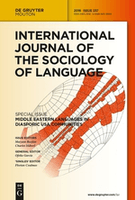
International Journal of the Sociology of Language
Unraveling the Interplay Between Language and Social ContextsInternational Journal of the Sociology of Language (ISSN: 0165-2516, E-ISSN: 1613-3668) is a premier academic journal published by WALTER DE GRUYTER GMBH in Germany, focusing on the intricate relationship between language and society. Since its establishment in 1974, this journal has continued to serve as a vital platform for disseminating high-quality research and theoretical discussions within the realms of linguistics and social sciences. Notably, it holds an impressive Q1 ranking in Linguistics and Language and maintains robust positions in Scopus rankings, being placed in the 84th and 83rd percentiles in the Arts and Humanities and Social Sciences categories, respectively. The journal not only emphasizes the socio-linguistic aspects of language use but also aims to foster interdisciplinary dialogue, making it indispensable for researchers, practitioners, and students pursuing an understanding of language within its social contexts. Although it is not an open-access publication, its rich content and scholarly contributions continue to have a significant impact within the field, making it a recommended read for anyone interested in the sociolinguistic landscape.
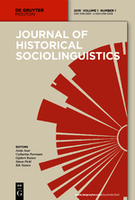
Journal of Historical Sociolinguistics
Decoding the Interplay of Language and Social FactorsThe Journal of Historical Sociolinguistics is a distinguished publication focusing on the intricate relationships between language and society from a historical perspective. Published by WALTER DE GRUYTER GMBH in Germany, this journal (ISSN: 2199-2894, E-ISSN: 2199-2908) is recognized for its rigorous scholarship, ranking in the Q2 quartile in Linguistics and Language (2023), highlighting its relevance and impact within the academic community. With Scopus rankings placing it at #326/1088 in Arts and Humanities and #386/1167 in Social Sciences, this journal is essential for researchers and scholars interested in the dynamics of language evolution, sociolinguistic shifts, and historical context. Through its insightful articles and contributions, the journal aims to illuminate the nuanced interplay between linguistic change and social factors over time, making it an invaluable resource for students, professionals, and academics alike. The journal operates under an open-access model, ensuring that knowledge is disseminated widely and freely accessible to those engaged in the cutting-edge studies of sociolinguistics.
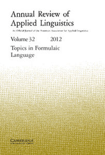
Annual Review of Applied Linguistics
Fostering excellence in applied linguistics scholarship.The Annual Review of Applied Linguistics, published by Cambridge University Press, stands as a premier journal in the realm of linguistics and psychology, with an impressive impact factor identifying its significance: ranking in the Q1 quartile across both fields in 2023. With an ISSN of 0267-1905 and an E-ISSN of 1471-6356, this journal endeavors to provide comprehensive and insightful reviews covering an array of topics within applied linguistics, thus supporting researchers, professionals, and students in advancing their understanding and expertise. Operating from its base in Cambridge, United Kingdom, the journal has maintained a consistent commitment to scholarly excellence since its inception, accelerating discussions on critical issues and emerging research trends from 2005 to 2024. Notably, it holds a prestigious position in Scopus, ranked #26 in Language and Linguistics and #30 in Social Sciences, showcasing its influence and contribution to the scholarship in the field. The Annual Review of Applied Linguistics thus stands as an essential resource for anyone engaged in linguistic research and application.
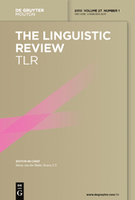
LINGUISTIC REVIEW
Unveiling Insights in Linguistics and Language.LINGUISTIC REVIEW is a prestigious academic journal published by De Gruyter Mouton that has established itself as a leading platform in the field of Linguistics and Language. With an impressive impact factor and categorized in the Q1 Quartile for the year 2023, this journal ranks within the top tiers of its discipline, indicating its influential contributions to linguistic research. Covering an extensive range of topics from theoretical frameworks to applied linguistics, the journal aims to foster scholarly dialogue and advance the understanding of language in its myriad forms. Researchers and students alike will benefit from the rigorous peer-review process and the availability of in-depth studies published from 1981 onwards. While the journal is not open access, it is renowned for its exceptional quality and relevance in both the Arts and Humanities and Social Sciences classifications, with Scopus rankings placing it in the top percentile of its peers. By offering insight from leading scholars, LINGUISTIC REVIEW remains an indispensable resource for those who are passionate about linguistic inquiry and its real-world applications.

Concentric-Studies in Linguistics
Pioneering insights into the world of linguistics.Concentric-Studies in Linguistics is a distinguished journal published by the National Taiwan Normal University, College of International Studies & Social Sciences. With an ISSN of 1810-7478 and an E-ISSN of 2589-5230, this journal contributes significantly to the field of linguistics, encompassing a wide range of topics from language acquisition to sociolinguistics. As of 2023, it holds a respectable Q3 ranking in both the Linguistics and Language categories, and it is positioned in the 28th and 24th percentiles within its Scopus ranks for the Arts and Humanities and Social Sciences, respectively. Although it operates under a traditional access model, its publication from 2014 to 2024 reflects a commitment to advancing academic discourse. Researchers, professionals, and students are encouraged to engage with its rich content as it provides a platform for innovative studies and critical analyses that push the boundaries of linguistic research.
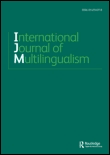
International Journal of Multilingualism
Advancing the frontiers of multilingual research.Welcome to the International Journal of Multilingualism, a leading platform dedicated to advancing the field of linguistics and language studies. Established by ROUTLEDGE JOURNALS, TAYLOR & FRANCIS LTD and housed in the United Kingdom, this journal has rapidly ascended to a prestigious Q1 quartile status in both the Linguistics and Language categories as of 2023, ranking in the top 4% across related disciplines. With a remarkable Scopus ranking of #35 in Arts and Humanities and #38 in Social Sciences, it is recognized for publishing high-quality, impactful research that spans a diverse array of multilingual topics. The journal thrives on its commitment to examining the complexities and dynamics of multilingualism in contemporary society, making it an essential resource for researchers, professionals, and students alike. Although Open Access options are not currently available, the journal's rigorous peer-review process ensures that each publication contributes valuable insights into the field. Since its inception in 2004, the International Journal of Multilingualism continues to foster academic discourse and innovation, solidifying its role as a crucial outlet for scholarly work by 2024 and beyond.

Language Policy
Connecting Language, Culture, and Policy InsightsLanguage Policy is a prestigious journal published by Springer, dedicated to the critical examination of language policy across various sociopolitical contexts. Since its inception in 2003, it has rapidly evolved into a leading platform, currently holding a Q1 status in both Linguistics and Language and Sociology and Political Science categories as of 2023. Nestled in the Netherlands, this journal aims to foster interdisciplinary dialogue, providing insights into the intricate relationships between language, culture, and governance. With a commendable impact factor and an impressive ranking in multiple Scopus categories, it is particularly valuable for researchers and professionals seeking to explore current trends and emerging issues in language policy. The journal does not offer open access, ensuring high academic standards and curation of quality research while appealing to a broad audience of academics and industry practitioners. Explore the multifaceted world of language policy through rigorous analysis and impactful studies presented within Language Policy.
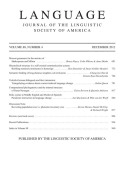
LANGUAGE
Pioneering Research in Linguistics and LanguageLANGUAGE, published by the Linguistic Society of America, is a premier academic journal dedicated to the rigorous study of linguistic theory and practice. With an ISSN of 0097-8507 and E-ISSN 1535-0665, this esteemed journal has established itself as a leading publication in the field of linguistics since its inception. The journal has consistently maintained a high impact factor, being ranked in the Q1 category in Linguistics and Language for 2023, placing it among the top tier of academic journals. Notably, it also holds impressive Scopus rankings, being positioned at #75 out of 1088 in Arts and Humanities, and #89 out of 1167 in Social Sciences, demonstrating a significant impact and reach in the discipline. While it is not an open-access journal, LANGUAGE provides crucial insights into linguistic research, fostering a vibrant academic community. Spanning years from 1996 to 2024, it continues to be an essential resource for researchers, professionals, and students alike, aiming to advance the understanding of language in its myriad forms and functions.